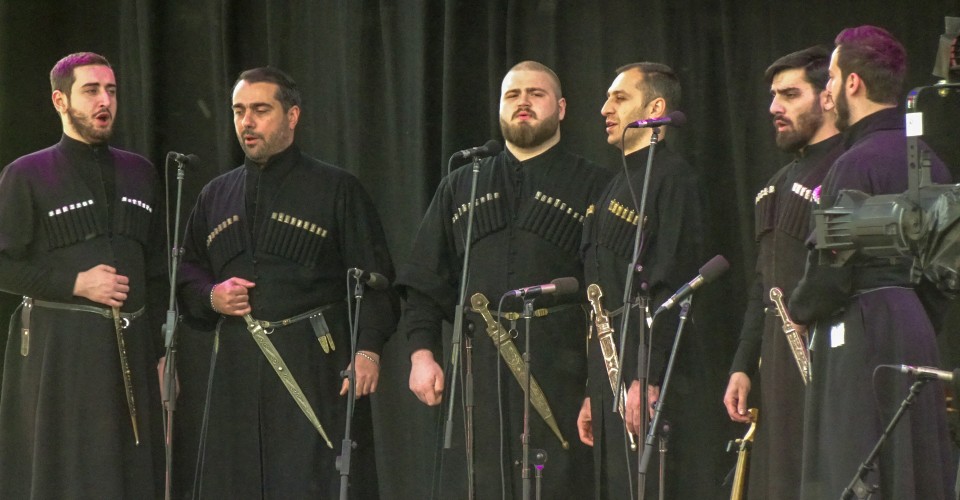[EVENT ~ WORLD MUSIC ~ INT]
Botanic Park, Sat 7 Mar
Day 2 dawned sunny and gentle. The Planet Talks venue has gratefully moved into a larger location – a tent called the Frome Park pavilion. The first session for the day focused on ‘the Wreck of Tech’ and was both insightful and depressing. All three speakers, Julia Powles, Peter Lewis, and Robert Elliott Smith, have written books or papers questioning the role and authority of the tech giants in our daily lives, and there was fairly solid agreement that they have not made our lives better. They reflected on the fact that rather than bring us together the new technologies have collapsed any notion of collective or commons where we might come together to solve problems. Google and Facebook’s business models that feed personal echo chambers have actually driven us apart. I left the session close to tears.
Violinist L Subramaniam has earned the tag ‘the Paganini of Indian classical music’. After some short information about the structure of the music they were about to play Subramaniam and his group, together with the help of some very audible bats (it was good to see they survived the summer heat) launched into what he called a ‘short’ raga – a beautiful slow building piece of musical meditation that was 30 minutes long!
Gelareh Pour is an Iranian now living in Australia. Her high-pitched dreamy vocals (it was hard not to think of Kate Bush) floated towards you as you approached the Zoo Stage. Accompanied by traditional instruments (Iranian versions of fiddle and lute) plus more conventional drums and electric guitar, her songs had a plaintively beautiful tone and slowly pulsating beats that were quite alluring.
One of Luisa Sobral’s songs won Eurovision in 2017. In my view that does nothing for your musical credibility but this Portuguese singer composer is something special. Her singing is full of class and smooth as silk, and her original songs are full of passion and sophisticated melodies. Unlike many WOMADelaide performers from lands where English is not the first language, she chatted away confidently about her life and how she was not going to let the Corona virus stop her from achieving her lifelong goal of coming to Australia. The arrangements of her material matched the quality of her songwriting. She was accompanied on guitar by her ‘Portuguese musician’, and a trio of fine local musicians on cello, woodwind and brass. Just gorgeous music and as great original music so often is – very hard to categorise.
Iberi (pictured) are from Georgia in the former Soviet Union, and appear in monk-like costumes with daggers. Their music now apparently drifts around in space on board Voyager 2 as an example of the beauty of the human voice. Their material is mostly a cappella, and sounds quite monastic. Intricate harmonies and stylised vocals from old Georgian folk tunes may make this music an acquired taste for some. I was reminded of the deep resonant tones of the Sardinian Tenors many WOMADs back.
Every WOMADelaide festival has a Celtic group to lead the fiddle and pipe charge and this year the responsibility falls to Ruru from Scotland. Their frantic and frenetic start drew the flock like Celtic lemmings to front of stage but I stuck to my guns and went to the next offering on the smaller stages – Catrin Finch and Seckou Keita down on Stage 7.
It was only a matter of time before a kora (or chora) player hooked up with a traditional harpist, and it has happened in this wonderful partnership between Senegal and Wales. Kora music has enchanted WOMADelaide audiences from the very early days and that much has not changed. Seckou Keita is a griot; someone who has inherited his musical tradition through his family, and he plays with flare and joy. It’s a little harder to be physically engaged when you’re stuck behind a harp but Catrin Finsch does a lot of smiling at Seckou’s antics and the wonderful sounds these 2 multiple stringed instruments make together. It’s a perfect harmonic blend with some entertaining rhythmic interplay between the two musical cultures they represent. Again the bats, just waking up now after a day hanging around upside down, joined in and it seemed entirely appropriate.
Such is WOMADelaide ?
5 stars
Michael Coghlan
WOMADelaide continues at Botanic Park from 11am until Mon 9 Mar.
Book at womadelaide.com.au. Click HERE to purchase your tickets.
#WOMADL20
The Clothesline Rating...
Michael Coghlan
A World Of Music Of Dance




